Related Research Articles

The Socialist Federal Republic of Yugoslavia, commonly referred to as Socialist Yugoslavia or simply Yugoslavia, was a country in Central and Southeast Europe. It was established in 1945 as the Federal People's Republic of Yugoslavia, following World War II, and lasted until 1992, breaking up as a consequence of the Yugoslav Wars. Spanning an area of 255,804 square kilometres (98,766 sq mi) in the Balkans, Yugoslavia was bordered by the Adriatic Sea and Italy to the west, Austria and Hungary to the north, Bulgaria and Romania to the east, and Albania and Greece to the south. It was a one-party socialist state and federation governed by the League of Communists of Yugoslavia, and had six constituent republics: Bosnia and Herzegovina, Croatia, Macedonia, Montenegro, Serbia, and Slovenia. Within Serbia was the Yugoslav capital city of Belgrade as well as two autonomous Yugoslav provinces: Kosovo and Vojvodina.

Prljavo kazalište is a rock band from Zagreb, Croatia. Since its formation in 1977, the group changed several music styles and line ups but remained one of the top acts of both the Croatian and Yugoslav rock scenes.

Time was a Yugoslav rock band formed in Zagreb in 1971. They were one of the most prominent acts of the 1970s Yugoslav rock scene.
New wave in Yugoslavia was the new wave music scene of the Socialist Federal Republic of Yugoslavia. As its counterparts, the British and the American new wave, from which the main influences came, the Yugoslav scene was also closely related to punk rock, ska, reggae, 2 tone, power pop and mod revival. Some of its acts are also counted as belonging to the Yugoslav punk scene which already existed prior to new wave. Such artists were labeled as both punk rock and new wave.
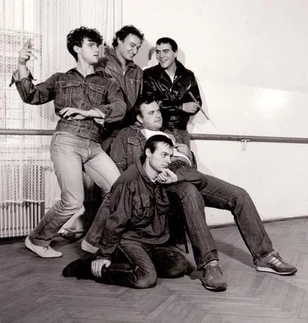
Lačni Franz was a Slovenian and Yugoslav rock band formed in Maribor in 1979. The band is considered one of the most prominent acts of the Yugoslav new wave scene, as well as one of the most prominent acts of the Yugoslav rock scene in general.
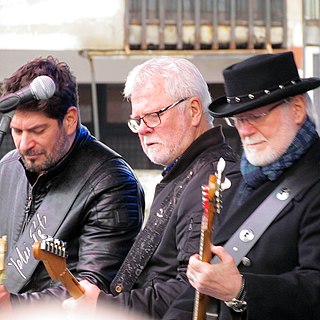
YU Grupa is a Serbian and former Yugoslav rock band. A pioneer in combining rock music with the elements of traditional Balkan music, YU Grupa is credited with being the longest-lasting Serbian rock band.
Punk rock in Yugoslavia was the punk subculture of the former Socialist Federal Republic of Yugoslavia. The most developed scenes across the federation existed in the Socialist Republic of Slovenia, the Adriatic coast of the Socialist Republic of Croatia, the Socialist Autonomous Province of Vojvodina and Belgrade, the capital of both Yugoslavia and the Socialist Republic of Serbia. Some notable acts included: Pankrti, Paraf, Pekinška patka, KUD Idijoti, Niet, Patareni and KBO!.
Popular music in Yugoslavia includes the pop and rock music of the former SFR Yugoslavia, including all their genres and subgenres. The scene included the constituent republics: SR Slovenia, SR Croatia, SR Bosnia and Herzegovina, SR Montenegro, SR Macedonia and SR Serbia and its subunits: SAP Vojvodina and SAP Kosovo. The pop and rock scene was a part of the general Music of Yugoslavia, which also included folk, classical music, jazz etc. Within Yugoslavia and internationally, the phrases ex-YU or ex-Yugoslav Pop and Rock both formally and informally generally to the SFRY period, though in some cases also to its successor the FR Yugoslavia including Serbia and Montenegro which existed until 2006.

Slovene culture is the culture of the Slovenes, a south Slavic ethnic group. It is incredibly diverse for the country's small size, spanning the southern portion of Central Europe, being the melting pot of Slavic, Germanic and Romance cultures while encompassing parts of the Eastern Alps, the Pannonian Basin, the Balkan Peninsula and the Mediterranean.
Generacija 5 is a Serbian and Yugoslav rock band formed in Belgrade in 1977.

Korni Grupa was a Yugoslav rock band formed in Belgrade in 1968. Launched and led by, as well as named after, the keyboardist Kornelije Kovač, the band was one of the first Yugoslav rock acts to achieve major mainstream popularity in the country, and often considered the first Yugoslav supergroup. Over the period since their dissolution, Korni Grupa went on to be considered among the most prominent and influential bands in the history of rock music in Yugoslavia. The band additionally used the Kornelyans name during a short-lived commercial foray outside of Yugoslavia in an attempt at breaking into the international market with an English-language album.
Igor Vidmar is a prominent Slovenian and former Yugoslav journalist, rock music promoter and manager, music producer and political activist.
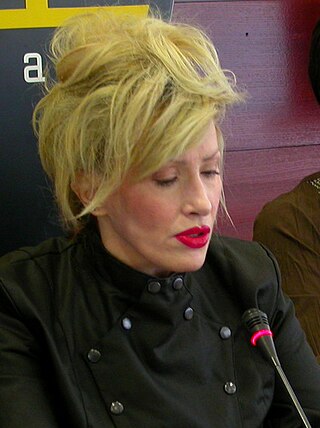
Aleksandra Milošević Hagadone, better known as Slađana Milošević, was a Serbian and Yugoslav singer, songwriter, record producer, and author.
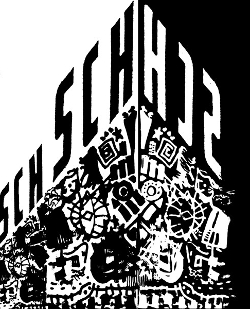
SCH is the first official album by SCH. The album was released following the band's successful appearance at the 1987 Novi Rock festival in Ljubljana. The recording line-up was Teno (vocals/guitar/bass/synth/noises), Samir Bjelanović (drums), and Petar Erak (bass).

Live is the first live album by Serbian and former Yugoslav rock band YU Grupa.
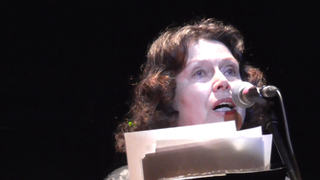
Katalin Ladik is a Hungarian poet, performance artist and actress. She was born in Újvidék, Kingdom of Hungary, and in the last 20 years she has lived and worked alternately in Novi Sad, in Budapest, Hungary and on the island of Hvar, Croatia. Parallel to her written poems she also creates sound poems and visual poems, performance art, writes and performs experimental music and audio plays. She is also a performer and an experimental artist. She explores language through visual and vocal expressions, as well as movement and gestures. Her work includes collages, photography, records, performances and happenings in both urban and natural environments.

Boye were a Serbian and Yugoslav rock band formed in Novi Sad in 1981. Until the late 1980s, Boye were an all-female band, but later lineups also featured male members, with drummer Biljana Babić being the only mainstay member during the band's career. Initially a part of the Yugoslav new wave scene, Boye later moved towards garage rock-influenced alternative rock. The band released four studio albums before disbanding in 2000.
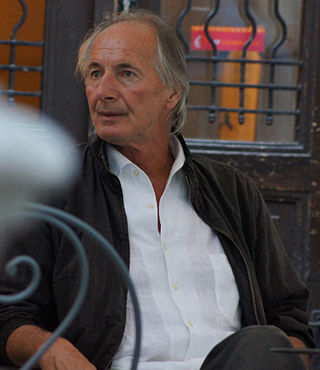
Janez Bončina, nicknamed Benč is a Slovenian composer, guitarist and singer. He is one of the leading authors and performers of Slovenian and Yugoslavian rock music. In the middle of the 1960s, Bončina with his friend Tomaž Domicelj from the group Helioni, showed his talent for music. Later with the group "Mladi Levi" he created projects which started the Slovenian pop rock scene.
Historically, among the most popular music festivals in Slovenia was the Slovenska popevka festival. Right after the World War II begun the long tradition of Jazz festivals in Slovenia, then part of the Titoist Yugoslavia, with the Jazz festival Ljubljana.
The 2016–17 Slovenian PrvaLiga was the 26th edition of the Slovenian PrvaLiga since its establishment in 1991. The season began on 16 July 2016 and ended on 27 May 2017. The official fixture schedule was released on 24 June 2016.
References
- ↑ "International Association of Music Information Centres".
- ↑ "Delo - legendarni rockovski festival".
- ↑ "Mladina - legende Novega rocka".
- ↑ "NOVI ROCK rockovski festival v Križankah 1981 - 2000". Archived from the original on 2011-07-07.
- ↑ "International Association of Music Information Centres".
- ↑ "Ljudmila: Frontier 036/Glasba: Igor Bašin - Novi rock: rockovski festival v Križankah: 1981–2000".